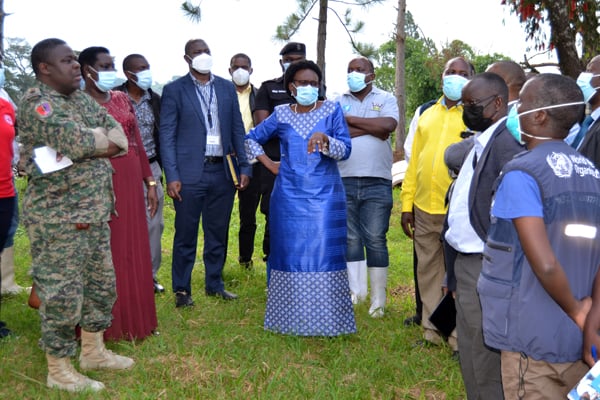Prime
Seven suspected Ebola patients flee from health officials

Health Minister Dr Ruth Achieng (C) and menbers of the Ebola National task force at Madudu Health Centre III in Mubende District on September 24, 2022.PHOTO/DAN WANDERA
The Ebola National taskforce is yet to locate seven suspected Ebola patients who reportedly escaped from the surveillance health teams in Mubende District, the epicenter of the disease.
The seven are among the contacts that are supposed to be at the Ebola isolation centre but escaped from the health teams before they could get to the Centre, the Ebola incident commander, Lt Col Henry Kyobe Bbosa told a stakeholder and taskforce meeting at Mubende District Council Hall at the weekend.
While it is clear that escapees are supposed to be subjected to monitoring at the isolation centre, a section of leaders believe that hiding away from possible treatment could escalate disease spread in cases where the suspects turn out to be positive while in the community.
“The communities need better sensitization on what happens at the isolation centre. There is a lot of misinformation about the isolation facilities. A section of the public claim that isolation facilities are areas where patients are subjected to stress due to lack of family company,” Mr Happy Cleophas, a District Councilor representing Lubimbiri Sub County in Mubende said.
But Mubende RDC, Ms Rosemary Byabasaija says while the incident is unfortunate, the taskforce is working hard to have all contact persons get to the isolation facility.
“We need to handle the Ebola outbreak decisively to ensure that our people survive the epidemic,” she said on Sunday.
Health Minister Dr Ruth Aceng called for proper coordination and sensitization of the community.
“The community should be made to understand that once you are listed as a contact person, you hand yourself in for treatment. If you run away, you are most likely going to die or spread the disease. An isolation facility is not a prison but for your own safety,” she said.
According to her, the Village Health Teams (VHTs) should be engaged because they live in the community and are in a better position to respond and report emergency cases quickly.
“The unusual health complications including deaths should be reported. We also need a re-orientation programme for the VHTs,” the minister said.
Ms Aceng observed that while the first registered case for the Ebola Sudan strain was registered on September 19, the earlier deaths that have been linked to the Ebola Sudan strain in the same area point to a gap within the community leadership, VHTs and the health care chain in the area.
The first cases for the Ebola outbreak in Mubende could be traced as early as August, 2022 in Mubende District. The Dr Kyobe said that the task force is pushing the investigation for a possible earlier date where the first case could have happened in August.





